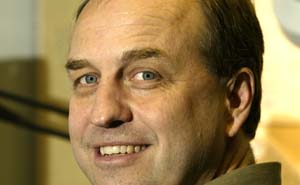 |
| Andrew Weaver is the Canada Research Chair in Climate Modelling and Analysis at the University of Victoria. |
Global Climate Change is a life-threatening problem, but we can solve it. First though, countries like Canada will need to do more.
That was the message behind climate scientist Andrew Weaver’s lecture, “Global Warming: The Scale of the Problem and the Path to the Solution” held earlier this month in the Marion McCain building.
Dr. Weaver, Canada Research Chair in Climate Modelling and Analysis at the University of Victoria, was invited to Dalhousie to deliver what was both the opening lecture in this year’s Killam Lecture Series focusing on “Oceans and Climate Change” and also the second annual Ransom Myers Lecture in Science and Society. The organizers of the lectures, which are usually separate events, were surprised to find they had both contacted Dr. Weaver about giving his talk. This led them to jointly sponsor one lecture.
When third-year political science student Brittany Steele saw that Ondaatje Hall in the McCain building was filled to capacity long before Dr. Weaver’s talk was set to begin, she knew she was going to be attending an exciting event. “To be honest I was a little bit surprised by how entertaining it was,” she said. “When I saw all the people here I realized that (Dr. Weaver) was clearly someone who had amassed quite a following and that there had to be a reason for all of these people to come out.”
Dr. Weaver certainly did not disappoint. Amidst occasional breakouts of cheers and laughter from the crowd, Dr. Weaver made his case with the use of slides and graphics. “We have to understand that scientists as communicators are horribly, horribly bad,” he said, drawing chuckles from the crowd. “We need journalists to help us get the message out about this stuff, but the problem is journalists can only write what they understand and right now we’re just not making this stuff easy enough for them.”
Ms. Steele, 20, said she appreciated Dr. Weaver’s honest approach to dealing with the shortcomings of both governments and the scientific community in dealing with climate change. “I was okay with the fact that he was able to criticize the Canadian government for not doing enough, but it was refreshing to hear him also say that people in the scientific community need to become better communicators.”
Much of Dr. Weaver’s lecture was devoted to the need for politicians to see beyond their own terms in office and make policy decisions that will have long term benefits for the global environment. “Part of the problem is politicians want results that they can see almost immediately,” said Dr. Weaver. “They’re not looking at what the results will be in 40 years time … They’re looking at what the results will show when they go for re-election in four years time, unless you live in Canada where we go to the polls every year.”
Katja Fennel, assistant professor in Dalhousie’s Department of Oceanography, called the event “a great success” and applauded Dr. Weaver for being “very engaging and entertaining.”
“He struck a perfect balance between confronting his audience of approximately 400 people with evidence for the seriousness of global warming and assuring them that it is not too late for action,” said Dr. Fennel.
Dr. Weaver said governments need to invest in new technologies that will help ease the effects of climate change and to adopt “carbon neutral” policies. “People always say that doing these kinds of things is bad for the economy – it’s not,” he argued. “More of the same just brought us into a global economic recession, so maybe the argument that investing in green technology is bad for the economy isn’t all that strong.”
He concluded his talk by previewing the United Nations conference on climate change taking place this December in Copenhagen. “It’s really very important that we get a new plan this December in Copenhagen. Our world leaders have to realize that we can do something about this but we all have to get on the same page and get moving before it’s too late.”
Other lectures in the Killam series are: “The Warming Arctic Ocean” by Louis Fortier, professor at Université Laval, on Nov. 26 and “Ocean Acidification” by Victoria Fabry, California State University, on Dec. 3. Both lectures take place at 7 p.m. in Ondaatje Hall.
